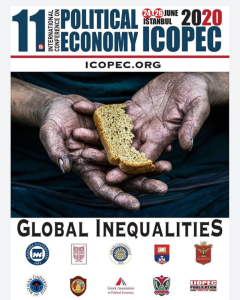I was an invited speaker in ICOPEC 2020 (Marmara University, Istanbul http://www.icopec.org/) The subject of my presentation was ‘Labour Process Theory: A Critical Reappraisal’ Below follow (a) the abstract of my talk and (b) my voice powerpoint ICOPEC 2020 11th International Conference of Political Economy ‘Global Inequalities’ June 24-26, 2020, Marmara University, Istanbul ‘Labour Process Theory: A critical reappraisal’ Stavros Mavroudeas Professor (Political Economy) Dept. of Social Policy Panteion University e-mail: [email protected] web: https://stavrosmavroudeas.wordpress.com Abstract Labour Process Theory was born after H.Braverman’s ground-breaking work ‘Labor and Monopoly Capital’ (1974). Its major contribution was that it reinstated at the foreground the Marxist
Topics:
Stavros Mavroudeas considers the following as important: Braverman, Fordism, labour process, Marxism, Mavroudeas, post-Fordism, Taylorism, Video από συνέδρια. τηλεοπτικές εκπομπές κλπ.- Videos from conferences, lectures, tv etc., Εισηγήσεις σε επιστημονικά συνέδρια - Papers in academic conferences, Χρήσιμο διδακτικό υλικό - Useful teaching material
This could be interesting, too:
Stavros Mavroudeas writes Is Neoliberalism still the dominant economic paradigm in the West today? – S.Mavroudeas
Stavros Mavroudeas writes ‘Economic Crisis and the crisis of Economics: Political Economy as a realistic and credible alternative’ – S.Mavroudeas (video and supporting material)
Stavros Mavroudeas writes Financialisation versus Marxism – S.Mavroudeas (video and supporting material)
Stavros Mavroudeas writes Once again on the shadow playing of Greek capitalism
I was an invited speaker in ICOPEC 2020 (Marmara University, Istanbul http://www.icopec.org/)
The subject of my presentation was ‘Labour Process Theory: A Critical Reappraisal’
Below follow (a) the abstract of my talk and (b) my voice powerpoint
ICOPEC 2020
11th International Conference of Political Economy
‘Global Inequalities’
June 24-26, 2020, Marmara University, Istanbul
‘Labour Process Theory:
A critical reappraisal’
Stavros Mavroudeas
Professor (Political Economy)
Dept. of Social Policy
Panteion University
e-mail: [email protected]
web: https://stavrosmavroudeas.wordpress.com
Abstract
Labour Process Theory was born after H.Braverman’s ground-breaking work ‘Labor and Monopoly Capital’ (1974). Its major contribution was that it reinstated at the foreground the Marxist analysis of Labour Economics as a credible alternative to both the Neoclassical and the Keynesian theories of Labour Economics. Following from this a vibrant discussion was born that led to the creation of the scientific sub-field of Labour Process Theory within the academia. Notwithstanding its crucial contributions and significant advances over the previous forty years, today the Labour Process Theory is in a stalemate. This has been accurately characterized as a state of identity crisis. This paper reviews the evolution of Labour Process Theory and periodizes it in four distinct phases. The first one is marked by Braverman’s seminal contribution and his deskilling thesis. The second one scrutinised several of Braverman’s stylized facts (and especially the deskilling thesis) and expanded analytical and empirical studies to new issues (e.g. labour market segmentation, power and control in the workplace, designing job descriptions, cohersion and consent in the factory). The third phase attempted a generalization of the Labour Process Theory and ventured into macroeconomic projections on the basis of it (e.g. theories about Fordist and psot-Fordist capitalism, Flexible Specialisation). The last phase is characterized by a distancing from the Marxist theory of the social mode of production, the Labour Theory of Value and class struggle and is being lost in interesting but limited empirical issues concerning the workplace and managerial strategies. This paper argues that a return to the foundations of Marxist economic analysis is necessary in order for the Labour Process Theory to regain its identity and explanatory power. This task is particularly pressing in the current era of rapid changes in the workplace and the labour market.

